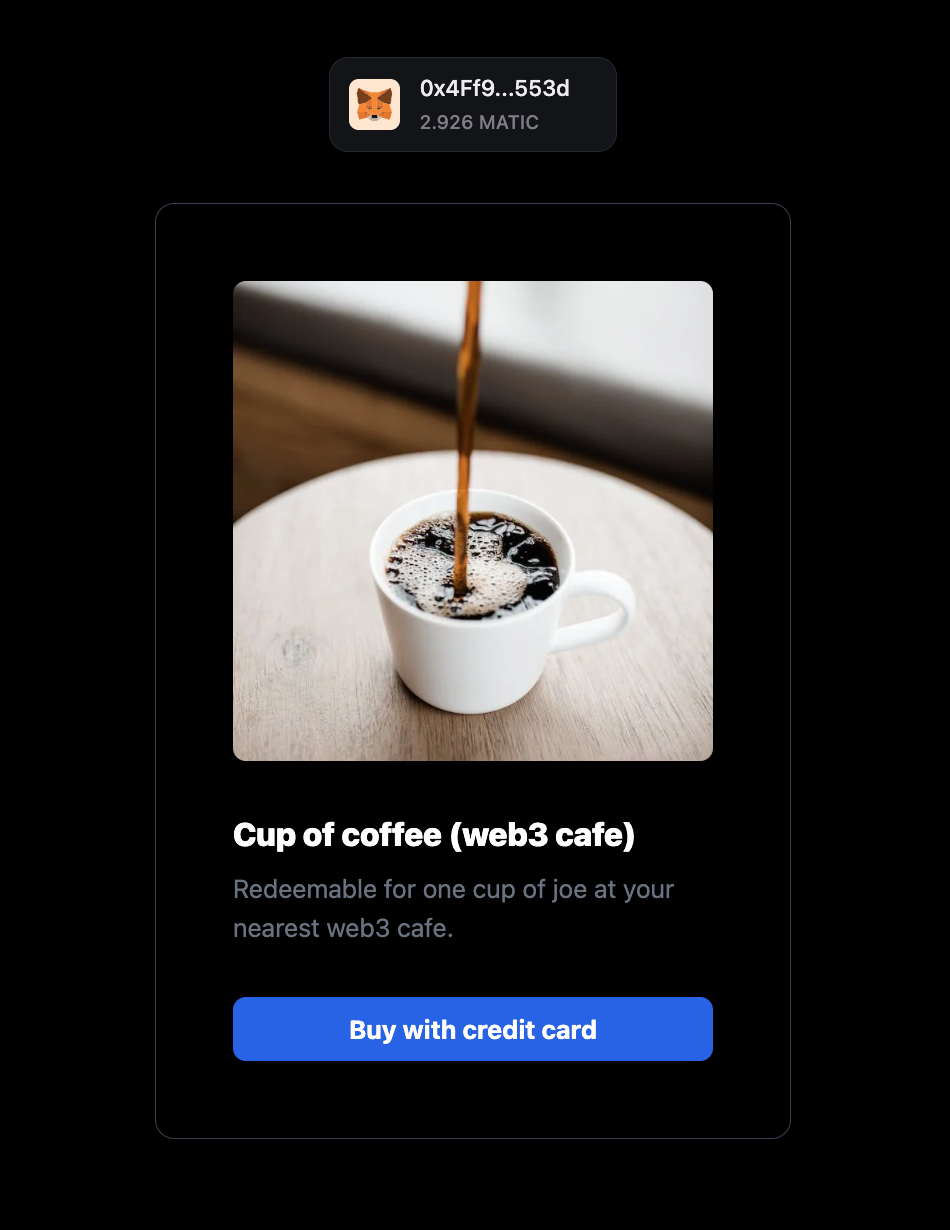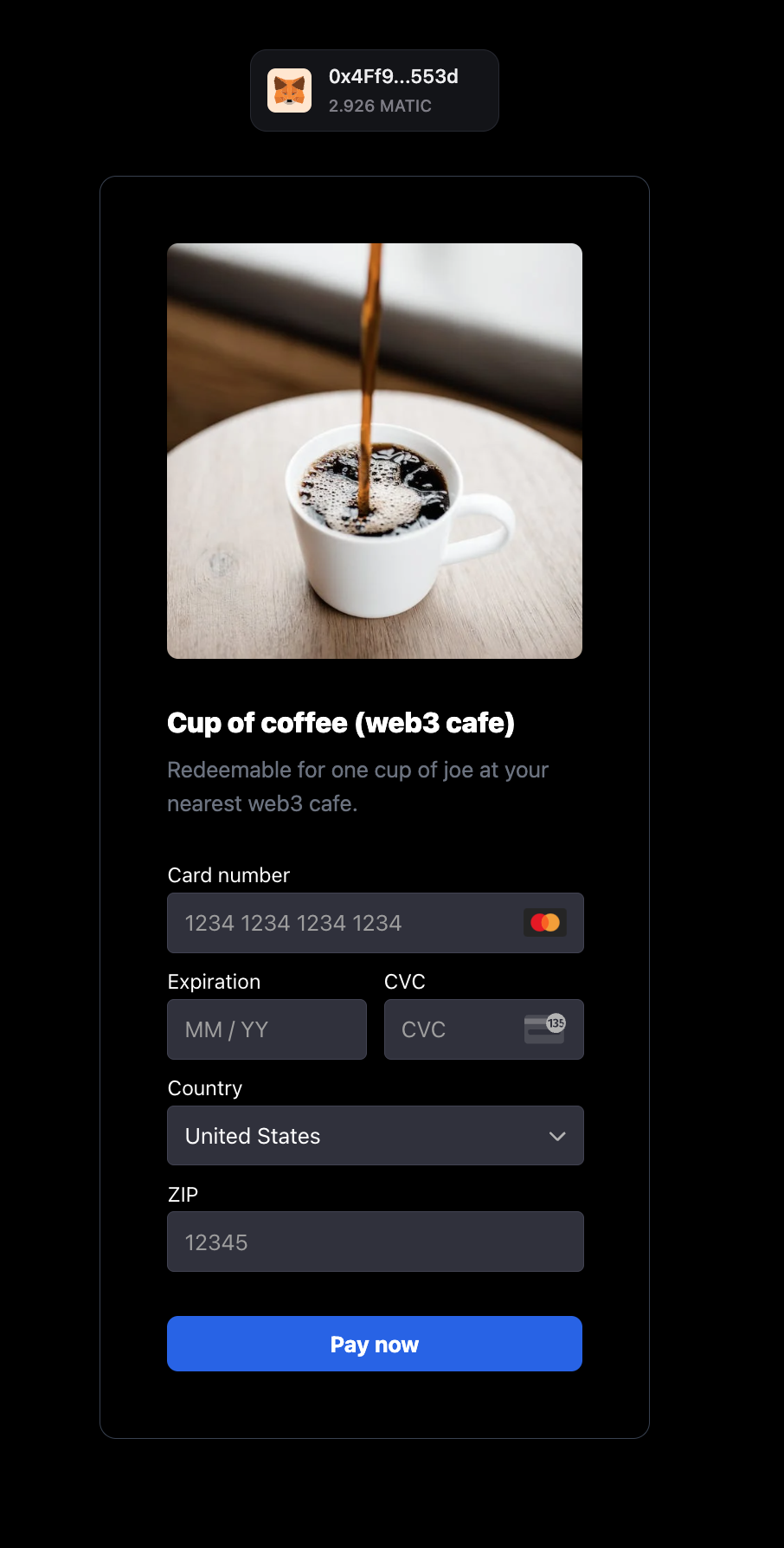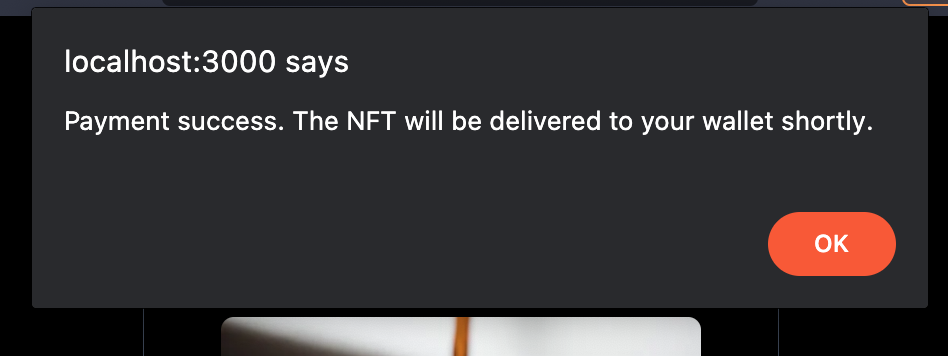NFT Checkout
This guide uses thirdweb Engine to sell NFTs with credit card:
- A buyer pays with credit card.
- Upon payment, your backend calls Engine.
- Engine mints an NFT to the buyer's wallet.
The buyer receives the NFT without requiring wallet signatures or gas funds.
This guide references Polygon Mumbai testnet and NextJS but is applicable for any EVM chain and full-stack framework.
Prerequisites
- A thirdweb client ID and secret key from the API Keys page
- An Engine instance
- A backend wallet with MATIC on Mumbai
- An access token for your Engine instance
- A deployed NFT contract that can be claimed by the backend wallet
- A Stripe account on test mode (no real payments will be made)
Frontend: Add Connect Wallet and credit card form
Use <ConnectWallet> to prompt the buyer for their wallet address. The buyer provides their credit card details and selects Pay now to send payment details directly to Stripe.
// src/app/page.tsx
export default function Home() {
return (
<ThirdwebProvider activeChain="mumbai" clientId="<thirdweb_client_id>">
<PurchasePage />
</ThirdwebProvider>
);
}
function PurchasePage() {
const buyerWalletAddress = useAddress();
const [clientSecret, setClientSecret] = useState("");
// Retrieve a Stripe client secret to display the credit card form.
const onClick = async () => {
const resp = await fetch("/api/stripe-intent", {
method: "POST",
headers: { "Content-Type": "application/json" },
body: JSON.stringify({ buyerWalletAddress }),
});
const json = await resp.json();
setClientSecret(json.clientSecret);
};
const stripe = loadStripe("<stripe_publishable_key>");
return (
<main>
<ConnectWallet />
{!clientSecret ? (
<button onClick={onClick}>Buy with credit card</button>
) : (
<Elements stripe={stripe} options={{ clientSecret }}>
<CreditCardForm />
</Elements>
)}
</main>
);
}
const CreditCardForm = () => {
const elements = useElements();
const stripe = useStripe();
const onClick = async () => {
// Submit payment to Stripe. The NFT is minted later in the webhook.
await stripe.confirmPayment({
elements,
confirmParams: { return_url: "http://localhost:3000" },
redirect: "if_required",
});
alert("Payment success. The NFT will be delivered to your wallet shortly.");
};
return (
<>
<PaymentElement />
<button onClick={onClick}>Pay now</button>
</>
);
};
Backend: Get a Stripe client secret
POST /api/stripe-intent returns a client secret which is needed to display the credit card form.
// src/app/api/stripe-intent/route.ts
export async function POST(req: Request) {
const { buyerWalletAddress } = await req.json();
const stripe = new Stripe("<stripe_secret_key>", {
apiVersion: "2023-10-16",
});
const paymentIntent = await stripe.paymentIntents.create({
amount: 100_00,
currency: "usd",
payment_method_types: ["card"],
// buyerWalletAddress is needed in the webhook.
metadata: { buyerWalletAddress },
});
return NextResponse.json({
clientSecret: paymentIntent.client_secret,
});
}
Backend: Configure the Stripe webhook
POST /api/stripe-webhook calls Engine to mint an NFT when a buyer is successfully charged.
// src/app/api/stripe-webhook/route.ts
export const config = {
api: { bodyParser: false },
};
export async function POST(req: NextRequest) {
// Validate the webhook signature
// Source: https://stripe.com/docs/webhooks#secure-webhook
const body = await req.text();
const signature = headers().get("stripe-signature");
const stripe = new Stripe("<stripe_secret_key>", {
apiVersion: "2023-10-16",
});
// Validate and parse the payload.
const event = stripe.webhooks.constructEvent(
body,
signature,
"<webhook_secret_key>",
);
if (event.type === "charge.succeeded") {
const { buyerWalletAddress } = event.data.object.metadata;
// Mint an NFT to the buyer with Engine.
const engine = new Engine({
url: "<engine_url>",
accessToken: "<engine_access_token>",
});
await engine.erc1155.mintTo(
"mumbai",
"<nft_contract_address>",
"<backend_wallet_address>",
{
receiver: buyerWalletAddress,
metadataWithSupply: {
metadata: {
name: "Engine Hackathon 2023",
description: "Created with thirdweb Engine",
image:
"ipfs://QmakhKF5oMyxupCZ2RsmcvPRyYTHnQzYeb9mQGv3RM81n1/hat.webp",
},
supply: "1",
},
},
);
}
return NextResponse.json({ message: "OK" });
}
Configure Stripe webhooks
Navigate to the Stripe webhooks dashboard (test mode) and add the /api/stripe-webhook endpoint and send the charge.succeeded event.
Try it out!
Here’s what the user flow looks like.
The buyer is prompted to provide their credit card.

They provide their card details.
Tip: Stripe testmode accepts
4242 4242 4242 4242as a valid credit card.

They are informed when their payment is submitted.

Full code example
The code above is simplified for readability. View the full source code:
FAQ
Can I accept different payment methods?
Yes! You provide the payment provider and can accept different currencies (EUR, JPY), digital wallets (Apple Pay, Google Pay), bank payments (ACH, SEPA), local payment methods (UPI, iDEAL), and more.
How is thirdweb NFT Checkout different?
thirdweb Checkout is a full solution that detects fraud, provides chargeback liability, accepts multiple payment methods including cryptocurrency, includes a prebuilt checkout UX, and more.